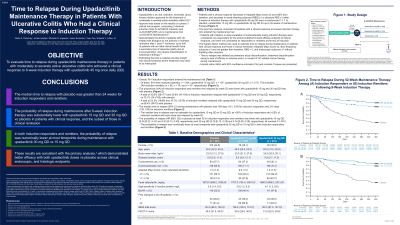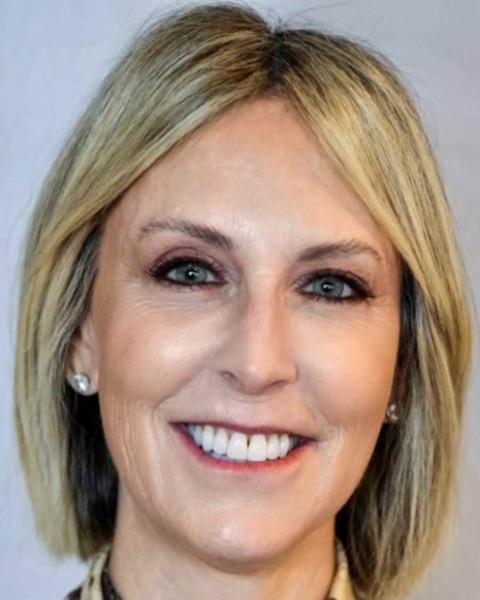Tuesday Poster Session
Category: IBD
P3604 - Time to Relapse During Upadacitinib Maintenance Therapy in Patients with Ulcerative Colitis Who Had a Clinical Response to Induction Therapy
Tuesday, October 24, 2023
10:30 AM - 4:00 PM PT
Location: Exhibit Hall

Has Audio

Marla C. Dubinsky, MD
Mount Sinai Kravis Children’s Hospital
New York, NY
Presenting Author(s)
Marla C.. Dubinsky, MD1, Jordan Axelrad, MD, MPH2, Michelle R. Kujawski, PhD3, Jason Eccleston, 3, Xuan Yao, 3, Edward V.. Loftus, MD4
1Icahn School of Medicine at Mount Sinai, New York, NY; 2NYU Grossman School of Medicine, New York, NY; 3AbbVie Inc., North Chicago, IL; 4Mayo Clinic College of Medicine and Science, Rochester, MN
Introduction: Upadacitinib (UPA) is approved for the treatment of ulcerative colitis (UC) based on results of a Phase 3 clinical trial program.1 This post hoc analysis evaluated time to relapse during maintenance in patients with a clinical response or remission after induction.
Methods: Patients with a clinical response (decrease in Adapted Mayo score ≥2 and ≥30% from baseline, and a decrease in rectal bleeding subscore [RBS] ≥1 or absolute RBS ≤1) after 8 weeks of UPA 45 mg once daily (QD) induction therapy (U-ACHIEVE Induction or U-ACCOMPLISH) were re-randomized 1:1:1 to placebo (PBO), UPA 15 mg QD (UPA15), or UPA 30 mg QD (UPA30) for 52-week maintenance therapy (U‑ACHIEVE Maintenance). The Kaplan–Meier method was used to estimate time to relapse (premature study discontinuation, treatment discontinuation owing to lack of efficacy or adverse event, or receipt of UC-related rescue therapy) in patients with a clinical response, and the subset of these in clinical remission (Adapted Mayo score ≤2, with stool frequency subscore ≤1 and not greater than baseline, RBS=0 and endoscopic subscore ≤1 without friability) after induction. Patients with initiation or dose escalation of corticosteroids during induction were considered non-responders. Hazard ratios (HRs) with 95% confidence intervals (CIs) and nominal p-values are presented.
Results: Overall, 413 (PBO, n=134; UPA15, n=135; UPA30, n=144) induction responders were analyzed, including 159 (n=54, n=47, and n=58, respectively) induction remitters. Median time to relapse with PBO was 169 days for induction responders and 224 days for remitters; the median was not estimable for UPA15 or UPA30 because < 50% of responders and < 25% of remitters with each dose had experienced a relapse by Week 52; Fig). In induction responders, the probability of relapse at Week 52 was lower with UPA15 (HR [95% CI]: 0.32 [0.23, 0.47]; p< 0.001) and UPA30 (0.17 [0.11, 0.26]; p< 0.001) vs PBO. Similar results were seen in remitters with UPA15 (0.21 [0.10, 0.44]; p< 0.001) and UPA30 (0.11 [0.05, 0.26]; p< 0.001) vs PBO. In both subgroups, the probability of relapse was numerically lower at most timepoints with UPA30 vs UPA15.
Discussion: The probability of relapse during maintenance was lower with UPA15 and UPA30 vs PBO in induction responders and remitters. These results are consistent with the primary analysis, which demonstrated better efficacy with both UPA doses vs PBO across clinical, endoscopic, and histologic endpoints.1

Disclosures:
Marla C.. Dubinsky, MD1, Jordan Axelrad, MD, MPH2, Michelle R. Kujawski, PhD3, Jason Eccleston, 3, Xuan Yao, 3, Edward V.. Loftus, MD4. P3604 - Time to Relapse During Upadacitinib Maintenance Therapy in Patients with Ulcerative Colitis Who Had a Clinical Response to Induction Therapy, ACG 2023 Annual Scientific Meeting Abstracts. Vancouver, BC, Canada: American College of Gastroenterology.
1Icahn School of Medicine at Mount Sinai, New York, NY; 2NYU Grossman School of Medicine, New York, NY; 3AbbVie Inc., North Chicago, IL; 4Mayo Clinic College of Medicine and Science, Rochester, MN
Introduction: Upadacitinib (UPA) is approved for the treatment of ulcerative colitis (UC) based on results of a Phase 3 clinical trial program.1 This post hoc analysis evaluated time to relapse during maintenance in patients with a clinical response or remission after induction.
Methods: Patients with a clinical response (decrease in Adapted Mayo score ≥2 and ≥30% from baseline, and a decrease in rectal bleeding subscore [RBS] ≥1 or absolute RBS ≤1) after 8 weeks of UPA 45 mg once daily (QD) induction therapy (U-ACHIEVE Induction or U-ACCOMPLISH) were re-randomized 1:1:1 to placebo (PBO), UPA 15 mg QD (UPA15), or UPA 30 mg QD (UPA30) for 52-week maintenance therapy (U‑ACHIEVE Maintenance). The Kaplan–Meier method was used to estimate time to relapse (premature study discontinuation, treatment discontinuation owing to lack of efficacy or adverse event, or receipt of UC-related rescue therapy) in patients with a clinical response, and the subset of these in clinical remission (Adapted Mayo score ≤2, with stool frequency subscore ≤1 and not greater than baseline, RBS=0 and endoscopic subscore ≤1 without friability) after induction. Patients with initiation or dose escalation of corticosteroids during induction were considered non-responders. Hazard ratios (HRs) with 95% confidence intervals (CIs) and nominal p-values are presented.
Results: Overall, 413 (PBO, n=134; UPA15, n=135; UPA30, n=144) induction responders were analyzed, including 159 (n=54, n=47, and n=58, respectively) induction remitters. Median time to relapse with PBO was 169 days for induction responders and 224 days for remitters; the median was not estimable for UPA15 or UPA30 because < 50% of responders and < 25% of remitters with each dose had experienced a relapse by Week 52; Fig). In induction responders, the probability of relapse at Week 52 was lower with UPA15 (HR [95% CI]: 0.32 [0.23, 0.47]; p< 0.001) and UPA30 (0.17 [0.11, 0.26]; p< 0.001) vs PBO. Similar results were seen in remitters with UPA15 (0.21 [0.10, 0.44]; p< 0.001) and UPA30 (0.11 [0.05, 0.26]; p< 0.001) vs PBO. In both subgroups, the probability of relapse was numerically lower at most timepoints with UPA30 vs UPA15.
Discussion: The probability of relapse during maintenance was lower with UPA15 and UPA30 vs PBO in induction responders and remitters. These results are consistent with the primary analysis, which demonstrated better efficacy with both UPA doses vs PBO across clinical, endoscopic, and histologic endpoints.1

Figure: Kaplan–Meier estimates of time to relapse during 52-week maintenance therapy among patients who achieved a clinical response (A) or were in clinical remission (B) following 8-week UPA 45 mg QD induction therapy.
Black triangles represent censored patients.
QD, once daily; UPA, upadacitinib.
Black triangles represent censored patients.
QD, once daily; UPA, upadacitinib.
Disclosures:
Marla Dubinsky: AbbVie – received consulting fees and/or acted as an advisor. Abivax – received consulting fees and/or acted as an advisor. AstraZeneca – received consulting fees and/or acted as an advisor. Bristol-Myers Squibb – received consulting fees and/or acted as an advisor. Eli Lilly – received consulting fees and/or acted as an advisor. Gilead – received consulting fees and/or acted as an advisor. Janssen – received consulting fees and/or acted as an advisor. Merck – received consulting fees and/or acted as an advisor. Pfizer – received consulting fees and/or acted as an advisor. Prometheus Biosciences – received consulting fees and/or acted as an advisor. Prometheus Labs – received consulting fees and/or acted as an advisor. Takeda – received consulting fees and/or acted as an advisor.
Jordan Axelrad: AbbVie – received consulting fees. Adiso – received consulting fees. BioFire Diagnostics – Consultant, Grant/Research Support. Bristol Myers Squibb – received consulting fees. Fresenius Kabi – received consulting fees. Janssen – received consulting fees. Pfizer – received consulting fees.
Michelle R. Kujawski: AbbVie – full-time employee of AbbVie, and might hold AbbVie stock or stock options.
Jason Eccleston: AbbVie – full-time employee of AbbVie, and might hold AbbVie stock or stock options.
Xuan Yao: AbbVie – full-time employee of AbbVie, and might hold AbbVie stock or stock options.
Edward Loftus: AbbVie – Consultant, Grant/Research Support. Alvotech – Consultant. Amgen – Consultant. Arena – Consultant. Avalo Therapeutics – Consultant. Boehringer Ingelheim – Consultant. Bristol Myers Squibb – Consultant, Grant/Research Support. Celgene – Consultant, Grant/Research Support. Celltrion – Consultant. Exact Sciences – Stock-publicly held company(excluding mutual/index funds). Fresenius Kabi – Consultant. Genentech – Consultant, Grant/Research Support. Gilead – Consultant, Grant/Research Support. GlaxoSmithKline – Consultant. Gossamer Bio – Consultant, Grant/Research Support. Iota Biosciences – Consultant. Iterative Scopes – Consultant. Janssen – Consultant, Grant/Research Support. KSL Diagnostics – Consultant. Lilly – Consultant. Morphic – Consultant. Ono Pharma – Consultant. Pfizer – Consultant, Grant/Research Support. Protagonist – Consultant. Receptos – Grant/Research Support. Robarts Clinical Trials – Grant/Research Support. Scipher Medicine – Consultant. Sun Pharma – Consultant. Surrozen – Consultant. Takeda – Consultant, Grant/Research Support. Theravance – Grant/Research Support. UCB – Consultant, Grant/Research Support.
Marla C.. Dubinsky, MD1, Jordan Axelrad, MD, MPH2, Michelle R. Kujawski, PhD3, Jason Eccleston, 3, Xuan Yao, 3, Edward V.. Loftus, MD4. P3604 - Time to Relapse During Upadacitinib Maintenance Therapy in Patients with Ulcerative Colitis Who Had a Clinical Response to Induction Therapy, ACG 2023 Annual Scientific Meeting Abstracts. Vancouver, BC, Canada: American College of Gastroenterology.
